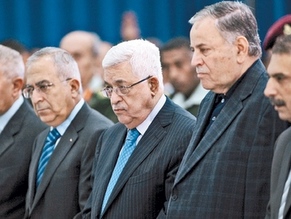|
World Jewish News

Palestinian President Mahmoud Abbas, center, and Prime Minister Salam Fayyad, second from left, in Ramallah earlier this month. Photo by: Reuters
|
Palestinian reconciliation remains uncertain as Fatah, Hamas agree on elections
16.11.2011, Israel In Palestinian politics, 10 days are an eternity. Still, barring a last-minute surprise, the weekend will see a historic agreement between Palestinian President Mahmoud Abbas and Khaled Meshal, head of Hamas' political bureau. The two are expected to set parliamentary and presidential elections for May, six years after the last parliamentary elections, and seven years since Abbas was elected. The meeting is scheduled to take place in Cairo, under the auspices of Egyptian intelligence.
The secret negotiations in the last few days were directed by Nader al-Assar, a former Egyptian consul to Israel and the man who mediated the Gilad Shalit deal. Under the agreement, a caretaker unity government will be established in the coming weeks that will exclude current Prime Minister Salam Fayyad.
Since a reconciliation between the two sides was announced last May, Abbas has tried to keep Fayyad as prime minister despite Hamas' objections. The main reason Abbas wanted Fayyad to stay was to ensure that the international community, Israel and the United States would continue to transfer much-needed cash to the Palestinian Authority.
But now, seeing that Israel was in no hurry to transfer Palestinian tax money, and seeing that the U.S. Congress was in a belligerent mood following the Palestinian bid for statehood in the United Nations, Abbas understood that he didn't have much to lose by dropping Fayyad.
Everyone who has met with Abbas lately has heard about his decision not to run for president and focus on his private life. Until recently, Hamas too was wary of elections, but the Gilad Shalit deal has strengthened its standing. Further, some see the Arab Spring as transforming into an Islamic Spring after the election results in Tunisia, and the expected gains for the Muslim Brotherhood in Egypt.
The third reason for Hamas' optimism is the realization that at this point, apart from Abbas, Fatah doesn't have a popular candidate for the presidency, which means Hamas might win that race as well.
It's still unclear who will replace Fayyad as caretaker prime minister - not that it really matters. In any case, he won't serve more than a few months and isn't expected to influence Israel's policy much regarding the Palestinian tax money.
The more important question is who will be Fatah's candidate for the presidency. Some officials believe that they will succeed in convincing Abbas to run one more time, but if he refuses, Fatah will find itself in an embarrassing position: The only candidate who is assured to beat any Hamas candidate is Marwan Barghouti, in prison in Israel for life.
Even if Meshal and Abbas agree about the May elections and the caretaker prime minister, it's still too early to talk about a lasting reconciliation. If both movements manage to keep the peace until May, it's doubtful that the victory of one of them in the elections will solve the deep problems facing the warring factions.
Hamas won't lay down its weapons in Gaza if Fatah wins, just as Fatah won't hurry to give up its control of the security apparatus in the West Bank if Hamas wins. After four and a half years of enmity, it's doubtful that even peaceful elections can heal the wounds and calm the hatred between Fatah and Hamas.
By Avi Issacharoff
Haaretz.com
|
|
